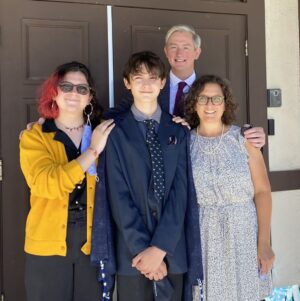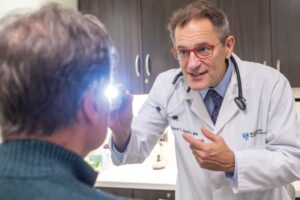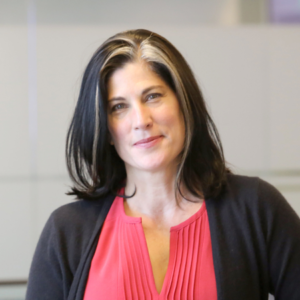Health + Medicine
Feature
The Pros and Cons of Consumer Genetic Testing
Dorothy Pomerantz vividly remembers the email that changed her life. It was 2018, and Pomerantz, who lives in Los Angeles, had completed a DNA test from 23andMe that included a Genetic Health Risk report. When the email containing her results appeared a few weeks later, she was curious but not fearful. There was little in her family history that might indicate a serious health risk, and none of her doctors had ever urged her to seek genetic testing. Opening the email, Pomerantz found a long tutorial, which she said she quickly clicked through, eager for her results. But reading them sent Pomerantz into shock. She had tested positive for a BRCA1 mutation, one of the most common genes linked to breast and ovarian cancer.
“It felt like I had been punched in the stomach,” said Pomerantz, 48, managing editor at a marketing and communications firm. What did this mean? Was she going to die? Should she prepare her children, then aged 11 and 14? Pomerantz called her gynecologist, who said the one thing she was not expecting to hear: “That’s great.”
“I was like, ‘What do you mean, that’s great?’ ” she recalled. “But from a doctor’s point of view, it is great, because they know. They’ve got really specific things they can do to take care of it.”

DNA testing kits from companies such as 23andMe, Ancestry and others have seen a surge in popularity in recent years. Along with information about heritage and traits like a propensity for a unibrow or stretch marks, 23andMe, for example, offers 10 genetic tests that assess risk for illnesses like Type 2 Diabetes, late-onset Alzheimer’s and Parkinson’s disease as well as the most common BRCA1/2 mutations. Dozens of companies market these tests, although only 23andMe has been independently approved by the FDA.
More than 26 million people have added their genetic information to the ancestry and health databases of the leading companies, according to a 2019 estimate by MIT Technology Review. While specific data on sales of health-related, at-home kits is not available, the Centers for Disease Control and Prevention noted in a 2018 report that purchases of bundled genealogy and health packages are on the rise.
Read More: A Pilgrimage Through Ancestral Lands
Along with gene banks at academic centers and government institutions, the large databases at consumer testing companies have become essential to genetic research. Both Ancestry and 23andMe conduct research with in-house scientists as well as contract with other research teams and pharmaceutical and technology companies. Consumers can opt in to the company’s research programs, allowing their genetic data to be included in medical studies. 23andMe alone has published over 160 papers in medical journals on a range of conditions, from Parkinson’s to depression and male-pattern baldness.
Read More: How Genealogy Became the Great Jewish Pastime
Currently, the hottest topic in genetic research is Covid-19, and both 23andMe and Ancestry are conducting large-scale studies with DNA from those who have tested positive. Aiming to understand how genetics impacts both susceptibility and disease severity, the 23andMe study includes over one million people who have answered survey questions about their health. Ancestry estimates their study size at about 750,000 participants so far. The companies have already released initial results, with 23andMe finding evidence that blood type plays a role in susceptibility and Ancestry linking genes to why men have a higher infection rate than women. Both companies are making data available to other researchers, and their results strengthen similar Covid-19 findings from Europe.
While consumer genetic testing provides clear benefits to research projects, for individuals, there are both advantages and risks in using at-home DNA testing as a predictor of future health.
Testing can provide previously inaccessible information about potentially life-threatening illnesses before they appear. Healthy individuals without a clear family history of disease rarely qualify for insurance coverage of medical-grade genetic tests. In addition, the kits are comparatively inexpensive, usually in the $100 to $200 range, while clinical DNA tests can cost anywhere from $1,000 to $3,000.
As an Ashkenazi Jew, Pomerantz was aware of her increased risk for BRCA1/2 mutations. Among Ashkenazi Jews, about one in 40 have a mutation, which carries about a 70 percent chance of developing breast cancer and a 44 percent chance of ovarian cancer by the age of 80, according to the National Cancer Institute. But without a family history, most health insurance companies do not consider Ashkenazi heritage alone as a criterion for genetic testing, even though research, including a 2020 study by 23andMe published in the journal Scientific Reports, found that about 50 percent of people found to have a BRCA mutation had no family history of cancer.
Even as at-home tests fill gaps in personal medical knowledge, physicians and genetic counselors are raising concerns that they are less comprehensive than the clinical tests and may fail to provide crucial support to consumers.
Dr. Robert Green, a researcher, medical geneticist and professor at Harvard Medical School, credits direct-to-consumer companies with helping to popularize the idea that preventive medicine should be available to everyone. But they have their limits, he said.
‘The really good impact of direct-to-consumer, when done by the leading companies, is that it has democratized the idea of getting genetic testing for health reasons.’
— Dr. Robert Green
“The really good impact of direct-to-consumer, when done by the leading companies, is that it has democratized the idea of getting genetic testing for health reasons: for prevention, for prediction, for risk assessment, for risk stratification,” said Dr. Green, who directs the Preventive Genomics Clinic at Brigham and Women’s Hospital in Boston. But an unfortunate byproduct is that these tests have “thoroughly confused people” about “two very different technologies.”

Dr. Green is referring to the microarray technology used by most consumer testing companies that analyzes only a small fraction of DNA. For example, 23andMe only looks for the three most common BRCA mutations, even though more than a thousand variants can lead to breast and ovarian cancer. Dozens of other genes have been linked to illnesses like heart disease, diabetes, kidney disease and other cancers. These can be examined more thoroughly through the sequencing technology used by many medical laboratories, along with more extensive interpretation of the data by geneticists. Clinicians worry that, despite disclaimers and fine print, users may not understand the limitations of an at-home test and that a negative result might provide a false sense of safety.
In addition, there is much debate over whether all genetic information is useful for individuals to know. Genes like BRCA1/2 as well as those associated with heart disease or colon cancer have been well studied and can provide clear information for physicians to recommend treatment. But what should people do with their genetic risks for conditions that are not preventable?

“Is this clinically actionable?” is one question that Catherine Ball, chief scientific officer at Ancestry, says guided the company in developing its AncestryHealth report, which launched in 2019. AncestryHealth has chosen not to offer risk assessment for Parkinson’s or Alzheimer’s disease, Ball said, both because there are no preventive treatments and because the likelihood of developing the disease is much less certain.
“What we are looking for are those absolutely straightforward genetic effects that have a really big impact on your health, and they’re something that you and your clinician can do something about,” Ball said. “We took the initial path of making sure that if you had the finding, you could take it to a health care provider and have a fruitful conversation. The last thing any clinic wants is a stampede of frantic people for whom the finding is not terribly informative or actionable.”
Ancestry has partnered with a network of physicians who order and review each report before it is released as well as provide access to genetic counseling. Consumers can also download a medical report to bring to their physician. However, most doctors will order a clinical test to confirm the findings of the at-home tests. At least three insurance companies—Blue Shield of California, Aetna and Anthem— have recently updated their policies to cover a clinical test following a consumer test, but only for BRCA mutations.
Ball sees AncestryHealth as advocating for people who could not otherwise afford genetic testing, and she urges purchasers to make sure any testing kit comes with clear, up-front statements about privacy, security and data use. Legally, the Genetic Information Nondiscrimination Act (GINA), passed in 2008, prevents employers and health insurance companies from discriminating based on genetic information. But privacy experts are still concerned as companies offer varying degrees of control to customers over how their genetics can be used. And if a company is sold or goes out of business, consumers may be left unclear about the security of their data. GINA also does not apply to life insurance, disability or long-term care coverage.
Read More: When a DNA Discovery Belongs to the Whole Family
Dr. Green, who cofounded Genome Medical, a telemedicine company that helps connect patients with genetic specialists, believes that the question of “actionability,” or whether all genetic tests are useful, is constantly evolving as medical research brings new health care advances. “What is non-actionable today is very likely to be actionable tomorrow,” he said. “If you don’t know what kind of genetic disease you have, you can’t be eligible for a research trial or for a treatment that has recently come out.”
Given the technological limitations and potential for confusing results, many genetic counselors see personal DNA testing as little more than recreational. Some are alarmed that companies deliver results, even devastating news, to consumers by email and without a conversation with a trained professional to clarify questions about the report and options for treatment.

“These results can be so easily misunderstood,” said Karen Arnovitz Grinzaid, a genetic counselor and executive director of JScreen, a national nonprofit carrier screening program for Jewish genetic diseases based at Emory University School of Medicine. “Involving a professional with experience in the area who can talk you through your options and connect you with appropriate resources is very important.”
JScreen’s program, which includes health care providers and genetic counseling, offers low-cost DNA testing for 226 genetic diseases, including many commonly found among Ashkenazi and Sephardi Jews. Grinzaid says the program has been successful in raising awareness about the importance of carrier screening before starting a family and helps couples plan for healthy children. JScreen also launched a national cancer genetic testing program in October with a panel of over 60 cancer-related genes.
Elana Silber, executive director of Sharsheret, a national organization for Jewish women facing breast and ovarian cancer, agrees that any genetic testing must involve genetic counseling as well. Along with education and emotional support, Sharsheret offers genetic counseling to women at all stages of cancer diagnosis and treatment.
“These are not easy results, and it affects your entire family,” said Silber. “So, you have to be able to understand, ‘How do I share this with my cousin, who I haven’t spoken to in 30 years? Does it affect my girls? Does it affect my boys?’ It’s not just a Jewish woman’s issue. This is a Jewish community issue. And that’s why it’s so important that every single person is made aware of the statistics, knows their family history and understands the options.”
While Dorothy Pomerantz believes that her 23andMe test ultimately saved her life, she said she would have much preferred to learn about her BRCA1 mutation from a human being. After a preventive double mastectomy and ovaries removal, Pomerantz is now healthy and has opted into 23andMe’s research program, which links those who used the test to researchers in over 230 genetic studies.
“Initially, I was going to be as private as possible,” said Pomerantz. “And then I went back in and said, ‘Use it for Everything.’ If I can help one other person, I want to help that other person. Obviously, everybody worries about privacy, but with this stuff, just give them your DNA. For the most part, it is going to be used for good.”
Sarah Yahr Tucker is a freelance writer and journalist based in Los Angeles.
You Won’t Want to Miss: When DNA Reveals Hidden Truths: An Online Event
November 18 at 8:00 PM EDT
Hadassah Magazine Discussion Group presents: How Genealogy Became the Great Jewish Pastime, with Executive Editor Lisa Hostein, featuring Dani Shapiro, Jennifer Mendelsohn and Libby Copeland.










 Facebook
Facebook Instagram
Instagram Twitter
Twitter
Amy Grahams says
I am from Nevada, USA.. I started on Mayaka Natural Clinic Parkinson’s Disease Herbal formula treatment in September 2018, Just 11 weeks into the Herbal formula treatment I had great improvements with speech and coordination, my hand tremors seized and the stiffed, rigid muscle had succumbed. I am unbelievably back on my feet again, this is a breakthrough for all Parkinson’s sufferers, visit Mayaka Natural Clinic official website ww w. mayakanaturalclinic. com